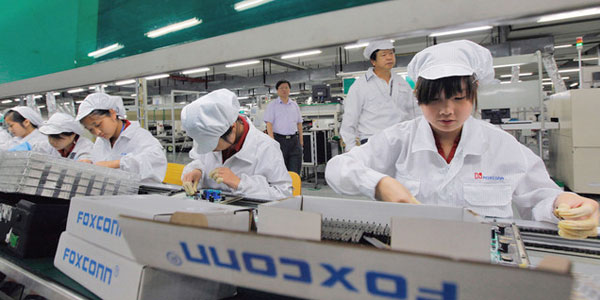
Remember when This American Life released an episode, “Mr. Daisey and the Apple Factory” that highlighted the harsh and unfair working conditions of Foxconn, the very place that made our favorite iPhones and iPads? The radio program just retracted the story on the basis that it was all made up. Okay, maybe not all of it. But a lot of it. Enough for Ira Glass to bring Mike Daisey back onto the show to figure out what he made up and what exactly happens at Foxconn.
The official retraction aired on Friday, March 16th (you can listen and read the full transcript here), which not only provided insight on how their producers finally pieced together what Daisey hid from them but also allowed a much needed conversation on how much truth in journalism matters. And I won’t lie: as much as I was shocked to hear what had happened, I also felt a sense of relief.
I can’t help but get defensive every time I hear a story criticizing something about Asia in the news–especially when it gets picked up by the major press, shared on every social network and emailed to us numerous times for coverage. First, let’s put this out there: the factory conditions in China are not up to par with what we Americans like to believe in. I understand this. But hearing parts of Daisey’s monologue, especially those that were later deemed fictional, took on an almost condescending tone. Here was an American man who had discovered how horrific, pitiful and sad these Chinese people were because they didn’t understand a better way of life. Take the man with the twisted claw hand who supposedly injured his hand while building iPads but had never seen one before:
He’s never actually seen one on, this thing that took his hand. I turn it on, unlock the screen, and pass it to him. He takes it. The icons flare into view. And he strokes the screen with his ruined hand, and the icons slide back and forth. And he says something to Kathy. And Kathy says, “He says it’s a kind of magic.”
Really? Magic? A worker (like the ones in the photo above) who spends hours of his day putting together iPads thinks it’s magical? Well, no. Because Daisey made that all up. He did meet a man with an injured hand but he never said he worked for Foxconn. How about the 13 year old worker he met in line, the one who so meekly cleaned his iPhone screen like a good Asian girl? Also made up. Cathy, Daisey’s interpreter who helped unravel the story, doesn’t remember meeting any 13-year-olds. Akrypti put my feeling best in her response piece to the original TAL story:
That’s the aspect of Daisey’s monologue that made me uncomfortable, not the actual monologue itself but the responses. What we Americans are really feeling is pity. We pity the Chinese factory workers because we look down on their lifestyles because by our assessment, our life is way better. Okay by any assessment our life is way better.
This American pity towards the Chinese annoys me. As Akrypti says, working and running a factory is more complicated than just fixing the work hours, just as trying to make ethical choices about technology is more complicated than simply boycotting products. In their retraction episode, Glass talks to Charles Duhigg who also investigated the Apple factory for The New York Times. Even he disagrees with Daisey’s attitude towards the Foxconn workers:
I do not think that you would find any factory in America where you would find those same conditions and you would not find any Americans who would tolerate those conditions. That being said, I think that China is a little bit different and that the expectations, particularly as a developing nation of workers, are a little bit different. I don’t think holding them to American standards is precisely the right way to look at the situation.
Not to mention that our American standards are sometimes just as bad as the standards of other countries. I’m not well versed in tech/business/labor issues but to hear that Daisey fictionalized some of the most touching details of his monologue for specific, dramatic effect, to drive his agenda closer to home, to appeal to our first world guilt? Yes, there’s relief. Factory life in China cannot be summed up in a simple East vs. West, White Man’s Burden tale. (The same goes for the whole recent Kony 2012 campaign but I won’t get into that.)
I’m of the mindset that truth is an integral part of nonfiction writing. I’ve met and listened to acclaimed nonfiction writers who like to play with the boundaries of what happened to fit their stories in order to reveal some sort of inner, emotional truth. I’m okay with this. Sometimes a story has to be told in a certain way. But when you stretch the truth for dramatic effect to garner sympathy or to support a personal agenda against an established brand or company, to pass your fiction along as fact, then you’re simply lying.
And I’d be lying, too, if I said I didn’t agree with anyone clicking “BORED” on this post.
PS. If you love long, awkward pauses in awkward, confrontational conversations, then I highly recommend you listen to the TAL retraction episode before it gets taken down.







